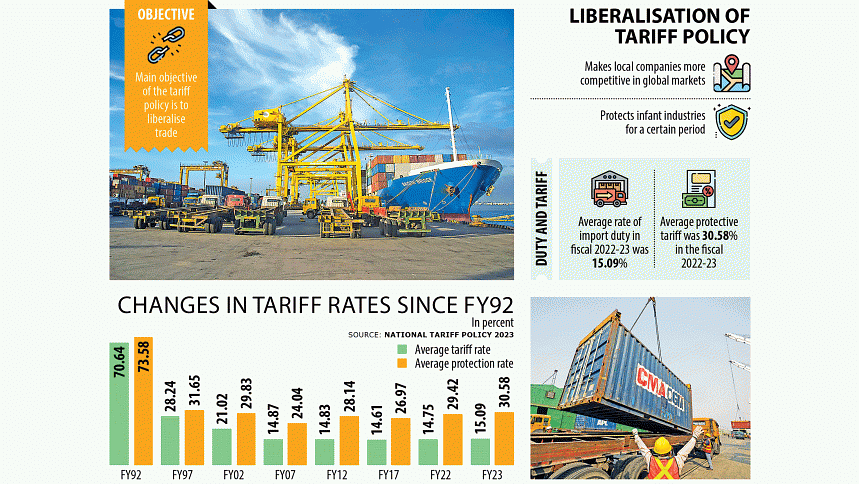Govt frames maiden tariff policy

Bangladesh has formulated its maiden tariff policy to improve the competitiveness of local companies in the international market as they brace for an increased competition after the country becomes a developing nation in 2026.
The commerce ministry published a gazette on the National Tariff Policy on August 10.
It aims to rationalise the import tariff structure as the country will not enjoy the preferential trade facility after it leaves the group of least-developed countries (LDCs).
Thanks to a high protection locally for a long time, domestic industries are reluctant to compete in the international markets and to be more competitive globally. Rather, they prefer to sell their goods in the domestic markets.
The rationalisation of tariffs will accelerate economic activities and generate more jobs while the government will gradually cut its dependency on import duties.
The National Tariff Policy aims to rationalise the import tariff structure as the country will not enjoy preferential trade facility after it leaves the LDC club
For instance, Bangladesh imported raw materials and intermediate goods worth $20 billion in FY22 from China to feed its local and export-oriented industries, yielding thousands of crores of taka in duty.
However, after the rationalisation of the tariffs, the government might not be able to collect such a huge amount of revenue in the form of import duties alone on Chinese raw materials and intermediate goods.
It is, however, expected that more goods will be imported at lower prices, allowing local entrepreneurs to add more value to their export-oriented items and be more competitive in the international market and paving the way for more economic activities and more revenues.
Besides, if the tariffs are fixed in line with global rates, more foreign direct investments might flow into Bangladesh since the cost of production in the country would decline.
Over the past few decades, the government has raised the supplementary and protective duties to offset the fall in revenue collection and protect domestic industries from international competitors, the gazette notification said.
As a result, the efforts to make local firms competitive have been affected.
Mostafa Abid Khan, a former member of the Bangladesh Trade and Tariff Commission (BTTC), says one of the major objectives of the tariff policy is to resolve many complexities in import tariffs since some are enjoying more benefits while some are not.
"Moreover, a high tariff is no more viable to attract foreign investments and make domestic industries globally competitive."
He warns that if taking preparation does not begin now, it would be difficult to be ready for the post-LDC era.
Import tariffs, comprising customs and regulatory duties, account for 10 percent of the total tax revenue of the government.
Khan said it is possible to generate the same amount of revenue from the domestic market if economic activities accelerate and more jobs are created.
A national committee will periodically review industries and advise the government to protect them, if required.
The committee will also recommend measures in favour of infant industries so that they can thrive and contribute more to the economy, Khan added.
Senior Commerce Secretary Tapan Kanti Ghosh said Bangladesh has always imposed tariffs unilaterally, but retaining the same practice would be difficult following the LDC graduation.
Bangladesh is negotiating with major trading partners to sign bilateral trade agreements to retain the preferential trade facility after graduation. But in the high tariff regime, the countries may not agree to ink such deals.
"Tariff rationalisation will indicate that the country is maintaining the standard set by the World Trade Organisation," Ghosh said.
Tariff rationalisation, however, does not mean that all tariffs will be made zero.
In some cases, tariff rates will be reduced while in other areas, the government will protect local industries by maintaining a sensitive list.
This means many domestic industries under the sensitive list or negative list will enjoy protection, the senior secretary said, adding that infant industries will get protection for certain years.
Ahsan H Mansur, executive director of the Policy Research Institute of Bangladesh, said tariff rationalisation has long been overdue.
The protective rate of Bangladesh is more than 30 percent whereas it is less than 9 percent in India and 4.7 percent in the Association of South East Asian Nations.
So, other countries will not feel encouraged to sign free trade deals with Bangladesh, said Mansur.
If Bangladesh wants to sign Comprehensive Economic Partnership Agreement, it will have to reduce the tariff rate.
"If Bangladesh wants to enjoy market access in other countries, we will have to offer the same level of market access to others after the LDC graduation," added Mansur.


 For all latest news, follow The Daily Star's Google News channel.
For all latest news, follow The Daily Star's Google News channel. 








Comments